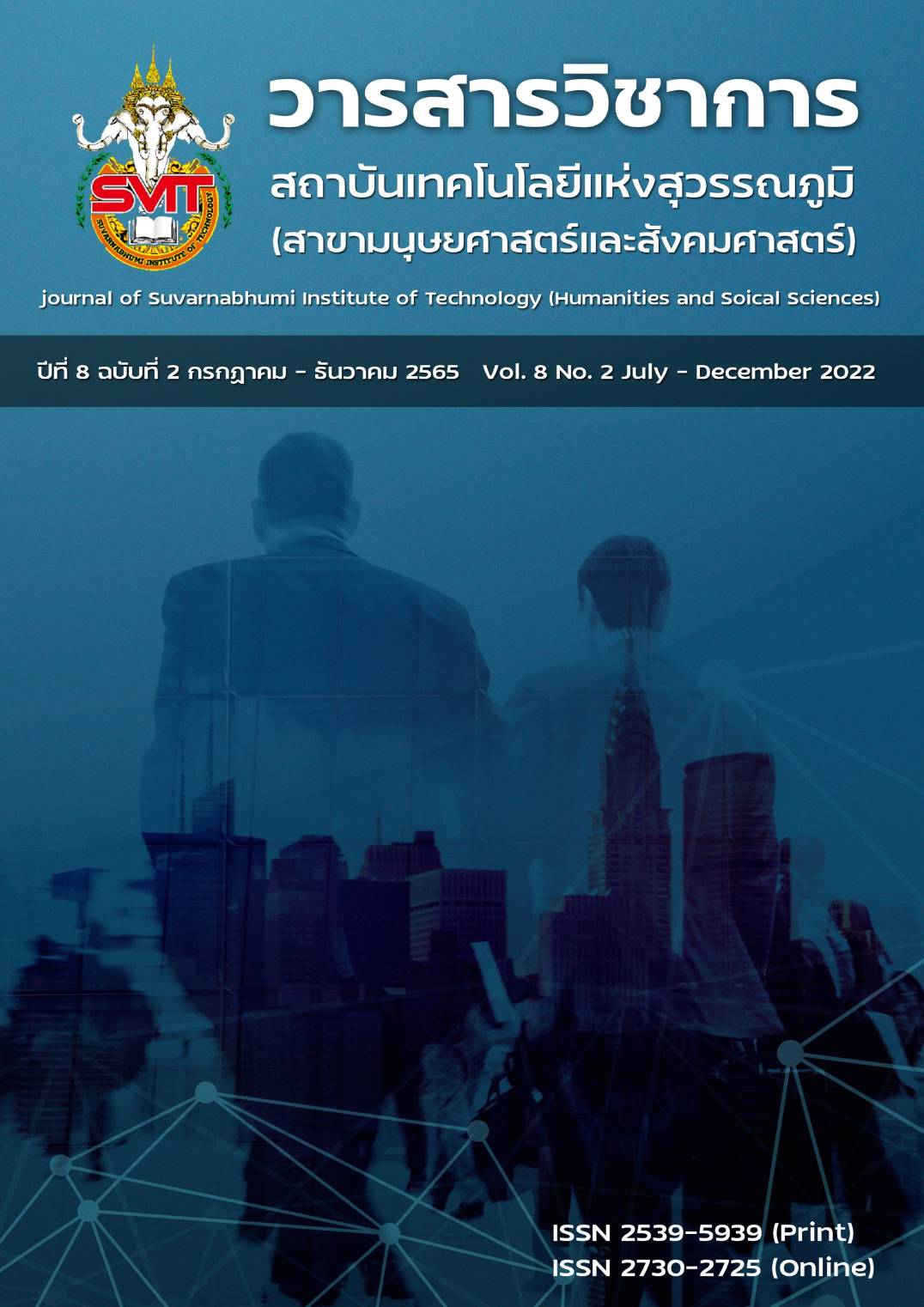THE THE COOPERATE SOCIAL RESPONSIBILITY ACTIVITIES AFFECTING COMMUNITY DEVELOPMENT IN THE AGE OF INDUSTRY 4.0
Keywords:
Corporate Social Responsibility Activities, Community Development, Industrial 4.0Abstract
Abstract
The study's goal was to look at how social responsibility activities influenced the development of communities near industrial estates in the Industrial Age 4.0. This was a qualitative study in which semi-structured interviews were utilized to obtain data from representatives of the establishment who were in charge of managing the organization's CSR efforts in the Amata Industrial Estates in Chonburi and Rayong. At least 14 people from seven different industries (2 from each) were questioned. The Board of Investment categorizes industrial kinds based on investment promotion requests (BOI). The findings demonstrated that the majority of establishments conducted CSR activities in accordance with the ISO 26000 standard. The executives in the establishments exercised social responsibility leadership, and they supported the establishment's CSR efforts. Employees participated in CSR activities. The majority of the businesses stated that they will engage in CSR activities to benefit the surrounding communities, both near and distant from the industrial estate where they were located.
References
กิติยา โต๊ะทอง. (2560). การจัดการศพตามวิถีอิสลามกับการจัดการสิ่งแวดล้อมอย่างยั่งยืน. วารสารการจัดการสิ่งแวดล้อม, 13(2), 100-107.
กังสดาล เชาว์วัฒนกุล, ยุทธนา ไชยจูกุล, & จารุวรรณ สกุลคู. (2558). ความรับผิดชอบต่อสังคมของผู้บริหารในสถาบันอุดมศึกษาเอกชน. วารสารสังคมศาสตร์และมนุษยศาสตร์, 41(1), 70-87.
คณะทำงานส่งเสริมความรับผิดชอบต่อสังคมและสิ่งแวดล้อมของบริษัทจดทะเบียน. (2560). นโยบายการกำกับดูแลกิจการ. เข้าถึงได้จาก www.set.or.th › overview › files › SET_CG_Policy_and_Conduct_2017
จินตวีร์ เกษมศุข. (2559). แนวทางความรับผิดชอบต่อสังคมขององค์กรสู่การดำเนินธุรกิจที่ยั่งยืน. Panyapiwat Journal, 8(2), 261-271.
ชาญวิชย์ อริยาวรนันต์, ฟ้าใส สามารถ, พลศักดิ์ จิรไกรศิริ, & กรเอก กาญจนาโภคิน. (2563). ความรับผิดชอบต่อสังคมในอุตสาหกรรมยานยนต์ กรณีศึกษา บริษัทโตโยต้า มอเตอร์ ประเทศไทย จำกัด. Journal of Administrative and Management. 8(1), 14-24.
ชัยยนต์ ทองสุขแก้. (2563). เมื่อธัญญาหารถูกผลาญสิ้น: อ่านโรคระบาดไวรัสและหายนภัยรรมชาติในนวนิยายวิทยาศาสตร์เรื่อง เดอะเดธออฟกราส (The Death of Grass). มนุษยศาสตร์สาร, 21(2), 214-234.
ธัญญลักษณ์ รุ้งแสงจันทร์. (2561). การรับมือกับการเปลี่ยนแปลงในยุค 4.0 ของแรงงานไทย. วารสารสังคมสงเคราะห์ศาสตร์, 26(2). 172-204.
ปัณณพงศ์ วงศ์ณาศรี. (2560). วิเคราะห์บริบทความท้าทายขององค์กรปกครองส่วนท้องถิ่นในการบริหารท้องถิ่นเพื่อขับเคลื่อนนวัตกรรมท้องถิ่นในยุคไทยแลนด์ 4.0. สารอาศรมวัฒนธรรมวลัยลักษณ์. 17(1), 63-78.
พิพัฒน์ นนทนาธรณ์, (2558). ปัจจัยเชิงสาเหตุของภาวะผู้นำที่มีอิทธิพลต่อภาพลักษณ์องค์การของท่าอากาศยานสุวรรณภูมิ. วารสารสมาคมนักวิจัย, 20(2), 48-58
พิพัฒน์ นนทนาธรณ์, (2561). อิทธิพลของภาวะผู้นำ ที่รับผิดชอบต่อสังคม การรับรู้ของผู้มีส่วนได้ส่วนเสียด้านความรับผิดชอบต่อสังคมขององค์การที่ส่งผลต่อภาพลักษณ์องค์การของท่าอากาศยานแม่ฟ้าหลวง เชียงราย. วารสารเกษตรศาสตร์ธุรกิจประยุกต์, 12(17), 73-88..
สมศักดิ์ สามัคคีธรรม, & สุจิตรา สามัคคีธรรม. (2560). จาก CSR ถึง CSV: แนวคิดว่าด้วยการทำประโยชน์และสังคมของภาคธุรกิจ. วารสารวิชาการสถาบันวิทยาการจัดการแห่งแปซิฟิค, 3(2), 220-236.
สถาบันวิจัยวิทยาศาสตร์และเทคโนโลยีแห่งประเทศไทย. (2562). แผนความรับผิดชอบต่อสังคมและสิ่งแวดล้อม ประจำปีงบประมาณ 2560-2564. สถาบันวิจัยวิทยาศาสตร์และเทคโนโลยีแห่งประเทศไทย (วว.) สังกัดกระทรวงการอุดมศึกษา วิทยาศาสตร์วิจัยและนวัตกรรม.
วิภา จงรักษ์สัตย์. (2558). ปัจจัยที่มีอิทธิพลต่อการเปิดเผยความรับผิดชอบต่อสังคมของกิจการในประเทศไทย. วารสารเกษตรศาสตร์ (สังคม), 36(2558), 230 - 243.
อังค์ริสา แสงจำนงค์. (2565 หน้า 73) การแยกแยะข่าวจริงข่าวปลอม และการเกิดรับรู้เชิงปฎิบัติการ ข่าวของกลุ่มนักศึกษาระดับปริญญาตรี. วารสารกองทุนพัฒนาสื่อปลอดภัยและสร้างสรรค์ปีที่1,(1) 73
Adedokun, M. O., & Kayode, G. M. (2019). Local Leadership Styles and Community Development: A study of the Irasa Community of Ado-Ekiti, Nigeria. BudapestInternational Research and Critics in Linguistics and Education (BirLE) Journal, 2(4), 27-31.
Borham, Y., & Yeasun, C. (2018). The effects of corporate social responsibility on firm performance: A stakeholder approach. Journal of Hospitality and Tourism Management, (37), 89-96.
Carroll, A.B. (1979). A three-dimensional conceptual model of corporate performance. The Academy of Management Review, 4(4), 497-505
Cohen, J. & Uphoff, N. (1980). Participation's place in rural development: Seeking clarity through specificity. World Development, 8, 213-235
Close-Scheinbaum, A., Lacey, R., & Liang, C. (2017). Communicating Corporate Responsibility to Fit Consumer Perceptions How Sincerity Drives Event and Sponsor Outcomes. Journal of Advertising Research, 57(4), 410–422.
Dincer, A., Maja, V., & Mislav, O. (2018). Communicating Corporate Social Responsibility on the Web: A Content Analysis of Sustainability Reports in World’s Best Multinational Workplaces. International Journal of Sustainable Entrepreneurship and Corporate Social Responsibility, 3(2), 1-17.
Freeman, E., & Dmytriyev, S. (2017). Corporate Social Responsibility and Stakeholder Theory: Learning from Each Other. SYMPHONYA Emerging Issues in Management, 1(2017). 7-15.
Grumiller, J. et al. (2018). The economic and social effects of the EU Free Trade Agreement (DCFTA) with Tunisia. Autrian Foundation for Development Research. German Federal Ministry for Economic Cooperation and Development (BMZ).
Ghiotto, L. & Echaide, J. (2019). Analysis of the agreement between the European Union and the Mercosur. Berlin: Anna Cavazzini MEP, The Greens/EFA
Gregory, C., Simone, T., & Zachmann, G. (2019). How to make the European Green Deal work. Policy Contribution, 14(November 2019), 1-14.
Kreicbergs, T., & Pelse, M. (2019). The Importance of Corporate Social Responsibility for the Today’s Consumer: Opions of Consumers and Experts. Economic Science for Rural Development Conference Proceedings, 52(-), 62-68.
Licandro, O.D., Garcia, A.G.R., Alvarado-Pena, L.J., Osuna, L.A.V., & Correa, P. (2019). Implementation of the ISO 26000 Guidelines on Active Participation and Community Development. Soc. Sci, 8(263), 1-18. DOI:10.3390/socsci8090263
Morgan, D.L. (1997). Focus groups as qualitative research. Thousand Oaks: Sage Publications.
Wolfgang C., et al. (2018). Climate change and interconnected risks to sustainable development in the Mediterranean. Nature Climate Change, Nature Publishing Group, 8 (11), 972 - 980.
Zinenko, A., & Rovira, M. (2015). The fit of the social responsibility standard ISO26000 within other CSR instruments Redundant or complementary?. Sustainability Accounting, Management and Policy Journal, 6(4), 498-526
Downloads
Published
Issue
Section
License
Copyright (c) 2022 Suvarnabhumi Institute of Technology

This work is licensed under a Creative Commons Attribution-NonCommercial-NoDerivatives 4.0 International License.
The articles published are copyrighted by the Sarasas Journal of Humanities and Social Science. The opinions expressed in each article in this academic journal are those of the individual authors and do not reflect the views of Sarasas Suvarnabhumi Institute of Technology. The authors are solely responsible for all aspects of their respective articles. Any errors or inaccuracies in the articles are the sole responsibility of the authors.



